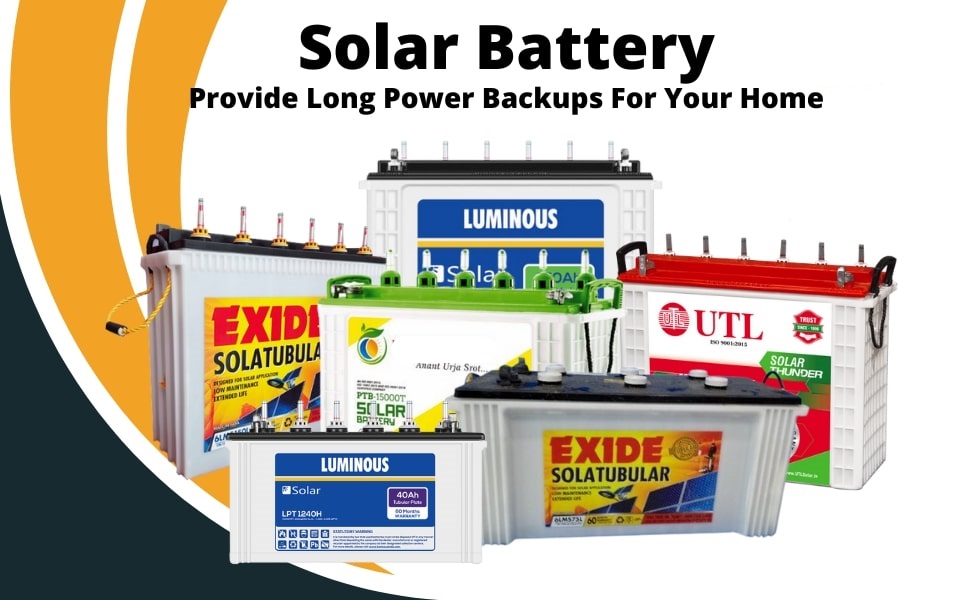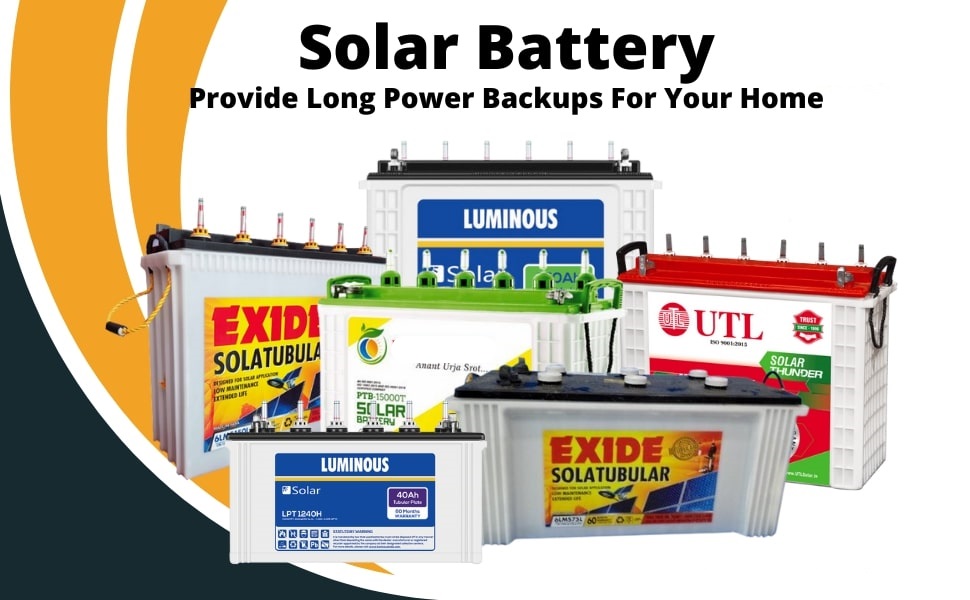What Are the Best Solar Batteries for Energy Storage? (2022 Full Guide)
I am In this article, we’ll cover:
- What is the best battery for solar?
- Which solar batteries last the longest duration?
- Which company makes the top solar battery?
- Is lithium any good for solar storage?
Using a Solar Battery Bank
So, where do batteries come into play? A solar battery bank is a solar energy storage system that will store energy that’s produced by your system rather than sending it back to the grid, allowing you to use it later. Then, when your unit is not producing any energy (for instance, after dark or on cloudy days), you can tap into those energy reserves in your solar battery bank.

The economics of a solar battery makes perfect sense; the more solar energy stored, the less energy you’ll have to purchase from your utility company. In recent years, however, people have started to realize the importance of solar batteries as backup power during a prolonged power outage. With growing instances of extreme weather exposing the vulnerabilities of our infrastructure, battery options and solar panels are becoming a mainstay for those in outage-prone areas like the Southeast and West Coast.
As a homeowner, you may be wondering: Who are our recommended installers of solar batteries? If you want to jump straight to getting a quote for a battery installation, you can follow the links below to speak with a verified professional. Continue reading to learn more about our favorite solar batteries.
What Are The Different Types of Solar Batteries?
As you may have noticed, there are a variety of different types of batteries for solar panels. In this context, type refers mostly to the chemical composition of the battery. Lithium-ion batteries are the most common type, but you may also hear about lead-acid batteries, AGM batteries, gel batteries, deep cycle batteries and more.
Lithium-Ion Batteries
The most commonly used batteries for solar panels today are lithium-ion. Advanced lithium-ion technology was developed for electric vehicle (EV) batteries, but the solar industry soon realized the potential it held for home energy storage. Lithium-ion batteries are appealing due to their density, high DoD and long lifespan.
All of the best solar batteries on our list use some form of lithium-ion technology. We should note that lithium iron phosphate batteries are a type of lithium-ion technology.
Lead-Acid Batteries
Lead-acid batteries are what you most likely associate with a common rechargeable battery. This technology has been in use for hundreds of years. Lead-acid batteries offer less than their lithium-ion counterparts due to their low density, shorter lifespan and slow charging. AGM (absorbent glass mat) batteries, sealed lead-acid-batteries, flooded lead-acid batteries and deep cycle batteries are all types of lead-acid batteries.
Flow Batteries
Flow batteries are an exciting emerging technology that could one day rival lithium-ion batteries. When supplied with energy from solar panels, an electrolyte liquid undergoes a chemical reaction, creating a flow of energy between two separate chambers within the battery. Flow batteries are appealing due to their 100% DoD, relative simplicity and the fact they don’t require as many rare metals.
Flow batteries are currently in development and are still too large for residential applications.
Final Thoughts: Solar Batteries
The bottom line is that to get the most out of your solar system, you’ll need more than just top-of-the-line panels. Having a reliable solar battery can also be crucial. Make sure you explore your options and account for your home’s specific energy needs when choosing the best solar batteries for your system.
If you want to book a professional solar consultation for free, you can do so by clicking one of the links below. A consultation with a certified company is a great way to find out what type of battery would work best for your home, how much your solar system would cost and how much you can save by taking advantage of local and federal solar incentives
What Is The Importance of a Solar Panel Battery Bank?
Before getting into the best solar batteries, let’s clarify why energy storage is so important.
How Solar Energy Works
When you make the decision to go solar, you’ll have an array of solar panels installed on your roof. If you don’t know thow solar panels work, hey collect energy from the sun and convert it into an electric current. This direct current (DC) electricity then passes through an inverter which turns it into an alternating current (AC), which is the type of electricity we use in our homes.
Most home solar panel systems are connected to local power grid systems, which means that any excess energy produced by your solar energy system is fed back to the grid. If your utility company has a net metering program, you can receive credits for this excess energy. By contrast, if your solar system does not produce enough energy to power your home at any point, you’ll draw energy from the grid.
How To Choose the Best Solar Battery Bank for Your Home?
As you consider investing in your own solar system, you’ll have a few types of solar panels and backup batteries to choose from. Here are a few key things to look for when seeking the best solar batteries for your home.
Battery Capacity
Capacity refers to the total amount of electricity you can store in your battery. It’s typically measured in kilowatt-hours (kWh). Note that most solar batteries are modular (or stackable), which just means that, by combining multiple batteries, you can pool their collective storage capacity so that you can store a higher amount of energy.
Power Rating
In addition to a battery’s capacity, you’ll also want to take a look at its power rating. This tells you how much electricity the battery can provide at any given moment, and it’s typically measured in terms of kilowatts (kW). We should note the difference between peak power rating and continuous power rating:
- Peak power refers to the maximum amount of power that can be provided at any one time
- Continuous power refers to the power that the battery can provide over a duration of time. We find the continuous power rating to be the more important figure.
So, how do power and capacity relate? Consider, for instance, a battery with a high capacity but a low power rating. This battery would be able to provide a small amount of electrical power (say, enough for a couple of small appliances) over a long period of time. A low capacity but high-power battery could produce enough electricity for much more robust appliances, but would only be able to power them for a short span of time after each charging cycle.
Depth of Discharge
Another important consideration is depth of discharge (DoD). This refers to the level of charge the battery must maintain at all times, as dictated by its chemical composition. The rule of thumb here is that a higher DoD means you’ll be able to utilize more of the energy storage system’s total capacity.
Round-Trip Efficiency
A battery’s round-trip efficiency measures the efficiency of the battery bank, or the amount of energy fed into the battery that can then be used. According to the U.S. Energy Information Association, the industry average round-trip efficiency of solar batteries sits around 80%, meaning that 20% of the energy fed to your battery by your solar panels is lost in the process. The higher the round-trip efficiency, the better the battery. None of the batteries on our list above have a round-trip efficiency of less than 90%.
Price and Warranty
Naturally, any time you’re investing in solar equipment, price point is going to be a big concern. Although you may not want to spend much on top of the cost of solar panels, keep in mind that what you’re really after is value and battery costs are only one factor. Different batteries have different life-cycles and costs associated with them, so paying less money for a less powerful battery may not be the most cost-effective option in the long run.
Closely related to price is warranty. Most batteries for solar panels will guarantee either a certain number of cycles or a set number of years. Warranty is something to weigh against price point, as it can have a major impact on overall value.

Very Good Information provide in this website about Solar batteries.